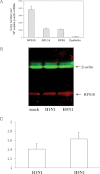H5N1 virus causes significant perturbations in host proteome very early in influenza virus-infected primary human monocyte-derived macrophages
- PMID: 22822004
- PMCID: PMC3491741
- DOI: 10.1093/infdis/jis423
H5N1 virus causes significant perturbations in host proteome very early in influenza virus-infected primary human monocyte-derived macrophages
Abstract
H5N1 influenza viruses, which cause disease in humans, have unusually high pathogenicity. The temporal response of primary human monocyte-derived macrophages infected with highly pathogenic H5N1 and seasonal H1N1 influenza viruses was evaluated using mass spectrometry-based quantitative proteomic profiling. This was done in order to demonstrate significant perturbation of the host proteome upon viral infection, as early as 1 hour after infection. This early host response distinguished H5N1 infection from H1N1 infection, the latter inducing less of a response. The most pronounced effect was observed on the translational machinery, suggesting that H5N1 might gain advantage in replication by using the cell protein synthesis machinery early in the infection.
Figures


References
-
- World Health Organization. Cumulative number of confirmed human cases of avian influenza A/(H5N1) reported to WHO. 2009 http://www.who.int/csr/disease/avian_influenza/country/cases_table_2009_.... (Accessed 19 December 2011)
-
- Kandun IN, Tresnaningsih E, Purba WH, et al. Factors associated with case fatality of human H5N1 virus infections in Indonesia: a case series. Lancet. 2008;372:744–9. - PubMed
Publication types
MeSH terms
Grants and funding
LinkOut - more resources
Full Text Sources
Other Literature Sources
Medical

